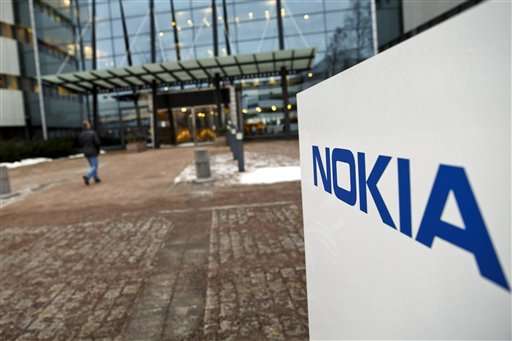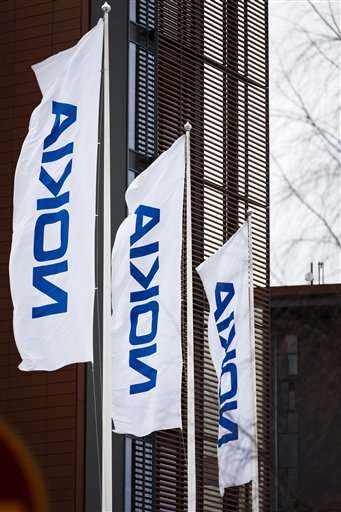Nokia aims to become networks giant with Alcatel-Lucent deal

Nokia is to buy ailing French telecom company Alcatel-Lucent for around 15.6 billion euros ($16.5 billion) through a public exchange of shares in France and the United States, in a bid that will see the newly created company become a leading global networks operator.
Though Alcatel-Lucent has been racking up billions of euros of losses since its creation in 2006, Nokia seems to believe it can cut costs and hopes the deal will give it scale in the market of providing the networks that mobile phones use.
The Finnish company said Wednesday that the all-share transaction will be on the basis of 0.55 of a new Nokia share for every share of Alcatel-Lucent. According to the deal, Alcatel-Lucent shareholders would own 33.5 percent of the fully diluted share capital of the combined company, with Nokia shareholders owning 66.5 percent.
Nokia stock was down nearly 2 percent at 7.35 euros in late trading in Helsinki while Alcatel-Lucent plunged more than 14 percent in Paris.
Mikko Ervasti, analyst at Evli Bank in Helsinki, said the deal puts Nokia among the global market leaders in networks.
"Nokia is clearly focusing on its networks operations and this acquisition makes it a big enough player to clearly challenge Ericsson, perhaps even in several sectors," he said.
The acquisition has been approved by both boards and is expected to close in 2016 subject to regulatory and other approvals, including from shareholders.
The combined company, known as Nokia Corp., will be based in Finland with "a strong presence in France," Nokia said.

Nokia CEO Rajeev Suri was upbeat on the takeover, saying he firmly believes it is "the right deal, with the right logic, at the right time."
But analysts warned that a crossover in operations would likely result in layoffs and cuts.
Ervasti described Alcatel-Lucent as a "sprawling" concern, and said Nokia might have to shed some operations.
"I think Nokia was interested in certain sectors of the company and had to bend over and make an offer for the whole lot," he said.
Nokia said it aims to make savings of 900 million euros in "operating cost synergies" by 2019 and some 200 million euros reductions in interest expenses per year by 2017.
Alcatel-Lucent CEO Michel Combes admitted a "pang of sadness in the heart" at the demise of the Alcatel brand but defended the deal as focusing on "development and growth."
"We had difficult periods, but now we are one of the building bricks for what will become a global technology giant," he said on France's Europe-1 radio. "Nokia is becoming today the leader of telecommunications networks thanks to Alcatel-Lucent."
Combes also said that they are committed to keeping job levels the same in France and that the project would include 500 more research and development jobs in France.
Both companies' chief executives met with French President Francois Hollande briefly on Tuesday afternoon, and the French government said it would support the deal.
Nokia, which began as a maker of paper and gum boots in 1865, transformed into a home electronics firm before becoming an innovator in the wireless industry and the world's top cellphone maker. But it met its match when Apple launched the iPhone and also was unable to compete against Google Inc.'s Android operating system and cheaper handsets from Asia.
It has made a turnaround since the 5.4 billion-euro sale of the lossmaking handset business to Microsoft a year ago, with three remaining sectors: networks, HERE mapping services and technologies and patents. Nokia said Wednesday it is looking into the potential divestment of its HERE business, but gave no details.
Alcatel-Lucent, which has undergone repeated rounds of restructuring since the 2006 merger of France's Alcatel and U.S.-based Lucent Technologies, is laying off more than 10,000 workers and last year made a net loss of 118 million euros.
Analysts said the deal could be the first of many in the sector.
"Half of telecommunications companies are planning acquisitions in the next 12 months, so we can expect further activity in the sector," said Pip McCrostie, Global Vice Chair of Transaction Advisory Services at consulting firm EY. "The appetite to acquire is exceptionally high in the closely aligned technology sector, with almost 70 percent of companies planning deals."
© 2015 The Associated Press. All rights reserved.
















